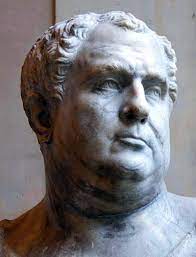Vitellius
Let's begin this installment with another of the emperors from the tumultuous "Year of the Four Emperors" (68-69 A.D.). We profiled the folly of the martinet Galba in our last installment. In this one let's take on the story of one of his successors, the wicked, gluttonous Vitellius, of whom no less a worthy than Roman senator and historian Tacitus wrote: "Seldom has the support of the army been gained by any man through honorable means to the degree to which [Vitellius] won it through his worthlessness.
Vitellius came from a noble family and before taking the throne had a long career as a government official, serving several of the previous emperors, including Caligula (who once famously ran him over with his chariot) and Nero, who Vitellius actually seemed to really like.
An aristocrat with no real military experience, Vitellius found himself in command of the critical legions defending the Rhine river border of the empire at the beginning of Galba's reign. Galba himself had appointed Vitellius to the position, in part because he thought Vitellius' military inexperience would keep him from doing as Galba himself had done: bribe his troops to proclaim him emperor and march on Rome.
 |
| Vitellius the Glutton |
By the time Vitellius had swatted aside yet another emperor-general (Otho, whose former wife was the pregnant bride the emperor Nero had kicked to death in a homicidal rage) whose troops had proclaimed him emperor and arrived in Rome. Galba was dead at the hands of the Praetorian Guard- because he was too cheap to pay them the bribe he had promised in exchange for their support.
Vitellius learned from his predecessor's example and made sure all promised bribes were paid. That wasn't enough, though. Vitellius had other problems.
Like the fact that his unsavory reputation, rapacious greed, venality and cruelty made him intensely unpopular. And then there was the fact that there was a more attractive option out there on the horizon. Vespasian, the general in command of the defense of Rome's eastern borders.
Vespasian's troops had proclaimed him emperor and he had begun his own march on Rome at around the same time as Vitellius. Because the Rhine is closer to Rome than the Syrian desert is, Vitellius got there first.
And that really seems to have been the extent of his good luck. Popular support swung in favor of the ever closer Vespasian. Vitellius panicked and unleashed a reign of terror intended to quell dissent and shore up public support for him. Thousands of citizens were butchered in the streets.
 |
| Vespasian the No-Nonsense |
Once Vespasian's troops had entered Italy, he sent word ahead for his elder brother, a respected lawyer, to negotiate a transfer of power with Vitellius. Vitellius agreed to meet with the brother, only to have him arrested and put to death–all with Vespasian's legions only a few days' march away.
Vitellius' remaining military support melted away after that point, and with Vespasian's troops entering the city, the all-but-deposed former toady attempted to flee Rome disguised as a a day laborer, his clothes stuffed with precious gems intended to help him make good his escape.
These gems proved his undoing–halted and searched by Vespasian's troops, Vitellius was caught out when they found his escape fund sewn into his clothes. Vitellius was duly dragged into the Forum where he was publicly tortured to death, his lifeless corpse then unceremoniously dumped into the Tiber (a common fate for condemned criminals at the time).
For his part, Vespasian, a hard-headed, no-nonsense career soldier who came from a middle class family, has no place thematically in this collection. He was far too smart, honesty and capable to commit the sorts of blunders enshrined herein. His second son Domitian, on the other hand....
But we'll talk about HIM next time.
See you in two weeks!

History has a habit of repeating itself and yet some don't learn.
ReplyDeleteI find the first couple of centuries following Julius fascinating. Rome flew so high and so low, both at once.
ReplyDeleteI believe Lindsey Davis set her novels in the Vespasian era. Good choice.
Ah, the amazing Roman generals turned emperors... At least he had two efficient sons - Titus and Domitian. If only Marcus Aurelius hadn't passed it on to HIS son.
ReplyDelete